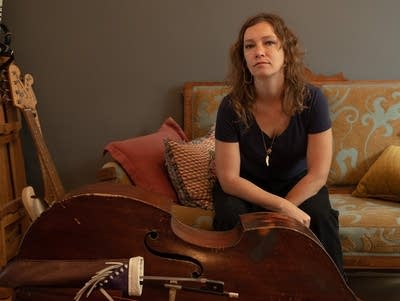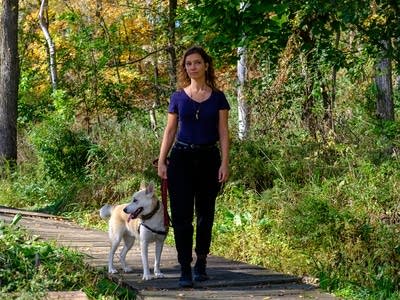Why bassist Liz Draper is a dazzling collaborator - and now, solo artist
by Jay Gabler
October 27, 2021

“Anything for Drapestar,” wrote keyboardist Tasha Baron in response to an interview query. While Baron might be the only one to use that particular nickname, when it comes to bassist Liz Draper the sentiment is broadly shared across the Minnesota music scene.
“She is one of the hardest, most obsessive workers I know on the planet,” said Baron, a close friend and collaborator since attending college with Draper two decades ago. “She’s not closed-minded at all. She’s not ever trying to sound a certain way. She's just trying to create whatever beautiful sound or wretched sound or dark sound is in her head, and she's great with collaborating with people and communicating that.”
Over the years Draper’s played with Soul Asylum, the Okee Dokee Brothers, the Cactus Blossoms, Davina Sowers, and many more – including Black Blondie, a band she formed with Baron. When Charlie Parr was ready to break his longstanding practice of playing and recording solo, he found Draper to be essential. When Low took the stage at the Square Lake Festival this fall, it was Draper on stage with Alan Sparhawk and Mimi Parker.
“Music is a super different kind of relationship, a different kind of communication than anything else I've ever done in my life,” said Parr. “Liz is one of the only people that I've been able to enter into that relationship with and feel like it's had nothing but a positive effect on me.”
For her part, Draper – who plays both upright bass and bass guitar – is still trying to get casual fans to understand what her instrument even is. “They'll see an upright bass or see me bowing,” she said, “and they'll call it a cello. Sometimes people are like, ‘Oh, is that a violin?’” If they do know what a bass is, she continued, they’ll assume that a bass player is a “dude just plugging away.”
No way, dude. “It can be melodic, it can be harmonic, it can be deep and provide the harmonic structure,” said Draper, her instrument visible behind her during a Zoom call from her living room. The bass “can be used for so many different kinds of sounds.”
Draper, whose father is jazz drummer Chaz Draper (“He was a huge influence on Liz growing up with music,” said Baron), started on piano and violin lessons at a young age. Her family lived in Fairmont before moving to Mankato when Draper was in junior high; there, she discovered that her true love was the bass.
“I was in school orchestra doing violin, and I just wanted to quit,” Draper remembered. “My dad was like, ‘What about just changing instruments? Maybe there's some other instruments somewhere that would really resonate with you.’ I was like, ‘Yeah, Dad, you're right. I want to try upright bass.’ And then I just got obsessed with it.”
She took her burgeoning obsession first to Interlochen Arts Academy, then to Perpich Arts High School, graduating in 2000 and moving to the University of Minnesota, where she majored in double bass performance.
“She always tells the story where I invited her to eat with me,” remembered Baron, who knew Draper only casually before they became classmates at the U. “I was all shy and intimidated by her, and then I just sort of didn't talk. But then, of course, that we got over that in, like, a second.”
Draper’s first major recognition in the Twin Cities music scene came through the band Black Blondie, which she and Baron formed 15 years ago with vocalists Sarah White and Samahra Daly. By the time the genre-busting band (the Star Tribune settled on “jazzy hip-hop/R&B/rock”) released their album Do You Remember Who You Wanted To Be in 2009, White had moved on and the band had “reimagined” themselves, explained Baron.
“We called ourselves ‘alternative R&B,’” said Draper. “It wasn’t a common thing...and to have a full band doing it, and women doing it! There’s a lot of folks that do similar stuff now, and it’s awesome.” (Black Blondie were supplemented by various drummers, including Kahlil Brewington on their LP.)
While they ultimately sunset the Black Blondie project, Draper and Baron have continued collaborating in the improvisational jazz group Hips Don’t Lie and simply under their own names, which have often shared recent bills at Icehouse and elsewhere. Draper also brought Baron in to record with Parr.
“There's been parts where I’ll be stuck in my keyboard brain,” said Baron, speaking to the duo’s dynamic musical relationship, “and then she'll come over and be like, ‘How about this?’ I'll be like, ‘That sucks!’ And then I'll be like...‘Oh, that's really good.’”
“She brings a lot of intuitive knowledge to music,” said Parr, “and can send you in directions that you hadn't really thought of. She’s built pieces for songs of mine that just stopped me in my tracks...and she's just done, apparently, off the cuff.”
Draper’s career has taken her across the country and throughout the state – whether by van, by boat, or by bike (she’s converted a Burley trailer to carry her upright bass) – but she’s remained rooted in Minnesota. “I love the community here,” she said. “I've always been really lucky to find people that I've wanted to collaborate with. It has been a really supportive place for me.”
She acknowledges that “it’s nice being near family, too.” She was living in a Minneapolis high-rise last year when the pandemic struck; all that elevator time started to feel unsafe, so she headed back to Mankato to stay with her parents. Then…“I met somebody, and now I bought a little house and I live in Mankato. It’s awesome!”
In addition to continued collaborations and teaching, Draper’s starting to step out as a solo artist: truly solo, as in original compositions for unaccompanied double bass. During lockdown she started an online performance series called Music: The Gathering. “I invited two other guest artists, and myself, to basically trade songs in the round. That helped me come up with a new piece or a new idea weekly.”
In May 2020, Draper released a solo EP called Hours. She describes the genre as “classicalfolkdoomjazz.”
Classicalfolkdoomjazz? “Well,” Draper laughed, “I like all of those things! I'm doing it all right now on upright bass, and I really like bowing, so anytime you bow people are kind of like, ‘Oh, it's like classical.’ I've always been drawn to...tonal centers that are maybe considered ‘ugly’ in quotation marks, but I don't find them like ugly at all. And I love folk music, especially Eastern European folk music.”
Draper’s recently been playing some solo shows to showcase this material, but it seems she’ll always have a long line of other artists eager to share a stage or a studio. That of course includes Parr, who’s recently joined with Draper in a new experimental group called portal iii.
“She's just a genuine soul,” said Parr. “She's an honest, pure-hearted individual who I just really enjoy spending time with.”
“She’s very passionate, very opinionated, has no filter,” said Baron. "She cares about everything from Indigenous people's rights to the environment.” As for her best friend’s musical chops, Baron continued: “Think about how many genres this woman plays! Totally, authentically plays, and has worked hard on.”
When Draper looks to the future, she doesn’t have a grand plan. “I’ve always been a year-or-two-out kind of person,” she said. “I just kind of want to be doing what I'm doing, which is making music with people that inspire me, and then also getting opportunities to make my own music.”
After stretching to clasp her hands behind her head and look upward in contemplation of the unknown future, the bassist dropped her arms to her sides, shrugged, and smiled. “I just feel so lucky.”









